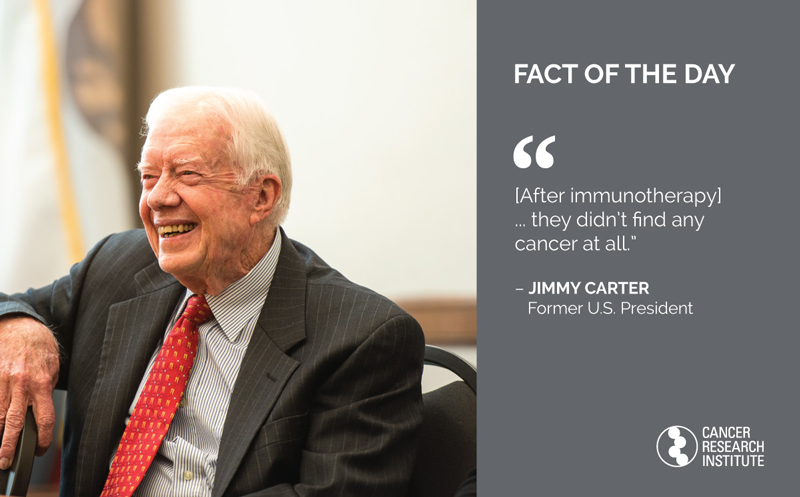Immunotherapy Fact of the Day #20: Immunotherapy Cured Jimmy Carter's Cancer

“[After immunotherapy] … they didn’t find any cancer at all.”
In August 2015, former U.S. president Jimmy Carter announced that his melanoma had spread to his liver and his brain. Several years ago, metastatic melanoma like Carter's would have been untreatable. Fortunately, Carter’s doctors used a relatively new approach that combined radiation with immunotherapy, a form of cancer treatment that uses the power of the immune system to prevent, control, and eliminate cancer.
First, doctors bombarded Jimmy Carter's cancer with radiation. The damaged and dying cancer cells likely attracted the attention of immune cells. Then, he received pembrolizumab (KeytrudaⓇ), an anti-PD-1 checkpoint immunotherapy, to support his immune system’s response and help it to completely eliminate the cancer.
In December, three months after Carter first began receiving immunotherapy, the then-91-year old found out that his tumors were gone. Based on the responses of other cancer patients whose tumors shrank or disappeared after treatment with immunotherapy, there is a high likelihood that President Carter’s immune system will continue to protect him against this type of cancer and that it won’t return.
Success stories like Jimmy Carter’s cancer immunotherapy story reveal that immunotherapy can help older patients.
Read more cancer immunotherapy success stories
Learn more about checkpoint inhibitors like pembrolizumab that Jimmy Carter received for his cancer treatment, immunotherapy treatments for different types of cancer, and immunotherapy clinical trials.
Supporting the Future of Cancer Immunotherapy
Your support of the Cancer Research Institute directly impacts the discovery and development of powerful immunotherapies for all types of cancers, funding more breakthroughs and saving more lives. Donate today to CRI and explore other ways to join our cause.
With your support, the Cancer Research Institute can, in turn, fund doctors and scientists leading immunology research and working to develop immunotherapy as a cure for all cancers.The following CRI-funded scientists are evaluating the clinical benefits of other combination approaches that utilize immunotherapy:
- James P. Allison, Ph.D., and others are leading the SU2C-CRI Cancer Immunology Translational Research Dream Team, which is performing comprehensive experiments aimed at improving immunotherapy’s ability to improve patient outcomes.
- Scott J. Antonia, M.D., Ph.D., and others are leading efforts to address the impact of adenosine in the tumor environment.
- Nina Bhardwaj, M.D., Ph.D., and Sacha Gnjatic, Ph.D., are investigating the relationship between checkpoint immunotherapy, chemotherapy, and mutations in advanced bladder cancer.
- Joshua Brody, M.D., is exploring if a combination immunotherapy in lymphoma patients can enhance dendritic cell activity.
- John M. Kirkwood, M.D., and Hassane M. Zarour, M.D., are evaluating an approach using the TIGIT receptor that may be able to complement PD-1 immunotherapy.
Discover different aspects of the science, history, development, and impact of cancer immunotherapy with 30 facts about immunotherapy, presented as part of our fifth annual Cancer Immunotherapy Month.
Stay up-to-date with the latest in cancer immunotherapy news by signing up for our e-newsletter.
Image credit: Creative Commons (via Commonwealth Club)